30 Day Spantik (7027m) Expedition From Islamabad
This part of Karakoram is visited by very few adventurers do we have the opportunity to experience the romantic wilderness of Karakoram in its prime form.
In the range of Rakaposhi – Haramosh, is the Spantik throne at the end of Chomolungma glacier. This beautiful summit of more than 7000m of difficult techniques climbed for the first time by a team from Frankfort in 1955 since then it is climbed regularly every year by many expeditions. Mostly it is climbed from South East because a classical regular ridge is going to the top. This mountain has some other names too, like Yengulz Har, Ganesh Chish (which translated into English as Golden Peak)
This mountain is visible from the village of Nagar (Hunza) so one can discover the terrible north face and its famous Northwest pillar of marble climbed in August 1987 by Flower and Saunders Moreover. The summit looks like gold in the light of sunset from Nagar which gives the name Golden Peak to this mountain.
To understand the way that we are going to climb, we have to walk 3 days on the glacier of Chomolungma to reach the base camp. This type of adventure depends on the great fitness of each person and their indispensable experience in high mountains. This expedition appeal to those people who have already roped autonomously on a snowy mountain and glaciers.
- Base Camp Team with Mess tents, kitchen tents, folding Chairs
- Climbing team with full Equipments
- 4X$ Jeeps to trek head.
- Luxury Transportation to skardu
- Air Port Pick & Drop
 Scheduling: Semi-Private Tour
Scheduling: Semi-Private Tour
 Languages offered on the Activity / Tour: English, German, French, Chinese, Urdu
Languages offered on the Activity / Tour: English, German, French, Chinese, Urdu
 Duration: 30 days
Duration: 30 days
 Mobile Voucher Accepted
Mobile Voucher Accepted Printed or Mobile Voucher Accepted
Printed or Mobile Voucher Accepted A minimum of 3 adults is required to book this tour
A minimum of 3 adults is required to book this tour Pick-up servicePick up from Islamabad airport.
Pick-up servicePick up from Islamabad airport. Easy CancellationThere is no cancellation fee once Customers Cancel at least 7 day(s) prior to the date of the activity or tour.
Easy CancellationThere is no cancellation fee once Customers Cancel at least 7 day(s) prior to the date of the activity or tour.
There is 50% cancellation fee for Customers to Cancel 3 and 6 day(s) prior to the date of the activity or tour.
There is 100% cancellation fee for Customers to Cancel 2 day(s) prior to the date of the activity or tour.
 Confirmation will be received at time of booking
Confirmation will be received at time of booking
- Mail handling/forwarding to BC/overseas except postage charges.
- Letter of guarantee on behalf of team/client for environmental bond.
- Insurance of our field staff and low altitude porters (except helicopter rescue).
- Wages and basic kit of guide, sirdar, cook and low altitude porters.
- Kitchen equipment, crockery, cutlery, fuel and related community gear.
- Mess/kitchen tent with table/field stools and camping ground fees.
- Road transfers between airport/hotel and within the city as per itinerary.
- Porterage of 75 kg per person of expedition equipment and high altitude food etc. to the B.C and 50 kg per person on return from BC.
- All meals during trek and 15 days at B.C.
- Hotel accommodation at Chancery Guest House (Islamabad), Concordia Motel (Skardu) and Panorama Hotel (Chilas) with all meals.
- Welcome reception (briefing)/farewell meeting (de-briefing) at Alpine Club of Pakistan.
- Assistance upon arrival/departure.
- Process of import/export permit from ministry of tourism.
- Liaison with ministry of tourism in Islamabad for permit process.
- Re- Fund If the cancellation is made 30 days + prior to departure full payment will be refunded and a nominal communication service charge will be deducted. RVT reserves the right to deduct: 25% cancellation charge from paid package price if the ca
- Permit, Pollution and Environmental fee or any other fee required to be paid by the Government of Pakistan.
- Hiring of HAPs, Thuraya Phone runner(s) and any other crew as per requirement. (Wages and kit to be arranged by the team).
- Insurance liability of member(s) and other under force majeure conditions.
- Room services, laundry, beverages, phone/communication bills and items of personal nature.
- Medications ground evacuations and helicopter rescue charges of any kind.
- Tents, sleeping bags, personal and climbing equipment of any kind beyond base camp including high altitude food and oxygen.
- High altitude porters/any crew above B.C.
- Surface transfers in case of flight cancellations to the kick off point.
- Domestic air fare Islamabad/Skardu/Islamabad, airport tax and excess baggage charges.
- Tips to field staff, drivers and porters
- Any other service not mentioned
- Clearance of cargo before arrival of the team and clearing agent’s charges
- Islamabad/Skardu or Skardu/Islamabad one way in economy class. Airfare is subject to change without advance notice by the airline. In case of cancellation of flight, we will be pleased to provide surface transfer in an exclusive coach.
Arrive Islamabad. Transfer to hotel for overnight.
Welcome reception (briefing) at Alpine Club of Pakistan. Overnight at hotel.
Upon arrival transfer to hotel for overnight. Sightseeing around Skardu. The 55 minutes flight to Skardu is a very thrilling and unique experience of flying between the towering icy peaks of the mighty Himalayan and rugged Karakorum ranges with extra-ordinary and unforgettable aerial views of clusters of mountains, and Glaciers. While flying don't miss to see the most spectacular views of Nanga Parbat (8124m) and K2 (8611m) from the cockpit.
These two mountains tower over all the others. In case of cancellation of flight (12 – 14 hrs) drive by coach to Chilas (480km) on Karakorum Highway. Overnight at the hotel. Driving on the KKH is no less exciting. The KKH is one of the most spectacular roads and the world's highest metalled border crossing. It connects Pakistan and China stretching over a distance of 1300 km between Islamabad and Kashgar winding through three mountain ranges and following the ancient Silk route along the Indus valley to the Chinese border at Khunjerab pass.
- Day free at Skardu. 2. If you are driving, complete road journey (07 – 08 hrs) to Skardu (275 km). Enroute stop on a viewpoint near Thalichi to take a view of Nanga Parbat. From this face, it was climbed on 3rd July 1953 by Austrian climber Hermann Buhl. It is a nice spot to take pictures in combination with Indus and the Nanga Parbat in the background. We cross the Alam Bridge over Gilgit River to continue our journey towards Skardu and drive on Skardu Road along the Right Bank of the Indus River.
- En-route we will have the close views of Nanga Parbat, the confluence of the Indus and Gilgit Rivers, junctions of the three mightiest ranges of Himalayas, Karakoram and the Hindu Kush as well as the rapids and falls of Indus River. The town of Skardu (2234m) is situated along the south side of the Indus River. It is a broad Valley about 40km long and 10km wide. Skardu is now the administrative centre of the District and also the transportation and commercial centre of Baltistan region.
It is a long day journey so start early. The road to Shigar Valley bridges the Indus from Thorego some (10km) east of Skardu. The road then runs through the sand dunes before climbing over a shoulder of the mountain from where a majestic view of the entire Shigar Valley can be seen up to the junction of Braldu and Basha Rivers.
The road then descends to the Shigar village (32km). From Shigar the jeep trek goes up the West Bank of the river. Enroute at Chu Tron we can see hot sulphur springs with separate bathing huts for men and women. The jeep track goes up the valley to the beautiful village of Doko (20km) from where we trek to Arandu the last village at the snout of the wonderful (38km) Chogo Lungma Glacier. The trail starts through walnut groves and then goes up and down the hillside with a beautiful view of cultivated fields and villages on the other side of the river.
It is an easy walk up to Sesko beyond which it becomes stony and slippery due to landslides. After Bulcho the valley opens up and after trekking about (5hrs) from Doko we reach Arandu. Overnight at camp above the village at about 2950 meters.
It takes about (8 hrs) to reach Bukhum, which is a summer settlement. The trail follows the Basha River upto the snout of the Chogo Lungma Glacier. After crossing the glacier follow the northern lateral moraine to Bukhum. Overnight at camp.
It is (5 – 8 hrs) trekking. Watching the miracle views of the pyramid of Spantik, passing through Manchikera, which is a summer settlement we reach another summer settlement of Khurumal. Overnight at camp.
It is relatively short stage, which takes (4 –5 hrs). Passing through the summer settlement of Gharincho and a small lake and enjoying the excellent views of Spantik and Laila Peaks we reach Bolucho, which is situated at the base of the Bolucho Glacier. Overnight at camp at about (3,900 meters) on a green ground with water.
We will establish three high altitude camps to climb Spantik. Going and returning between these camps will help acclimatize the team, which is key to success. Certain parts of the route between different camps will be equipped with fixed cords for safety and going and coming without any hassles.
We will climb about (8km) up to the origin of Chogo Lungma Glacier to set up camp I at 4550 meters. Camp 2 and camp 3 are installed at mini-summits of the southeastern ridge with a view of 360º. The route from Camp I up to (5100m) altitude consists of many ice pitches with many crevasses requiring 8 ropes to fix the line.
Beyond this point, up to camp 2, no rope is required. The climbing from camp 2 at (5500m) to Camp 3 at (6550m) comprises ice with some dangerous steep crevasses requiring 6 ropes to fix on this section. From Camp 3 to summit two ropes will be enough as a safety rope.
Return to Chogo Brangsa. Overnight at camp.
Return to Arandu. Overnight at camp.
Drive by jeep to Skardu. Overnight at hotel.
1. Fly to Islamabad at 1120 hrs (subject to weather conditions). Overnight at hotel. 2. In case of flight cancellation drive to Chilas. Overnight at hotel.
1. Leisure day at ISB. Overnight at hotel. 2. In case of driving, complete road journey from Chilas to Islamabad. Overnight at hotel.
Morning farewell meeting (de–briefing) at Alpine Club of Pakistan. In the evening transfer to airport for your homebound flight.
- While on an organized trek, it is best to pack all items for your trip in one large piece and one carry on. The large piece must be a duffel bag (weighing not more than 12.5 Kg.) because duffels are easier for porters to carry. A small daypack is suggested as a carry-on to keep items that you will use during while on the trek, bus or jeep. Luggage -Large duffel bag with a lock. It is not recommended to put your stuff in a backpack as the straps might get damaged while being transferred from bus to jeeps, jeeps to campsites and during loading and unloading by porters each day. A small padlock that fits through the zipper of your duffel bag is recommended.
- Day Pack - Large enough for camera gear, cap, sunglasses, water bottle, jacket and other items you may like to use while on the trek. Extra carry-on - For storing city clothes in Skardu. Money Belt - A small fanny pack, money belt or around the neck passport bag is suggested for keeping safe your passport, travel documents and money. Packing list for your Duffel.
- Sleeping Bag - As we shall be sleeping for four nights at Concordia at 4,700meters or at Snow Lake and Hispar Pass at 5151meters above sea level, so the bag should be rated for 0 degree F or -18 degree C. Ratings are all relative since the amount of insulation needed for a particular person to stay comfortable depends on their rate metabolism. A down bag will be warmer for its weight and pack smaller but does not retain its insulative properties when wet. A waterproof breathable shell or a bivy-bag will keep the bag dry. A synthetic bag keeps you warm even when wet and is a less expensive alternative, but will weigh more for a given amount of warmth. Trekking Boots - The single most important item on this list! Never take brand new boots on a trek, make sure they are well broken-in before departure. Good trekking boots are hard to get in Pakistan. If you are buying a new pair from abroad, look for medium-weight boots of fabric or a fabric/leather combination. They should provide adequate ankle support. A vibrum or other deep-lug will protect you from rocks and add support. Always use thick socks when trying shoes so that you get the correct size. Short shoes can jam your toes painfully during steep descents. You could also try to get new “Grouted” shoes that provide protection against water and are good while walking in rain or through the snow. Make sure you can fit crampons on your shoes, as it is vital for crossing different passes. Camp Shoes - Jogging shoes or sneakers to slip in at the end of the day. Tiva sandals are ideal for this trek, as you can use them while crossing streams and also at the campsite for strolls.
- Crampons - You may need crampons on certain treks, sometimes only for one day. It helps in having a better grip on hard snow to have crampons fitted to your boots. Look for easy to fix ones. (Check with us for your specific trek if you need the crampons or not). From our regular trek list, you would need to bring crampons for: Gondogoro La, Biafo Hispar and Wartum Peak Thermal socks - The socks you wear are a critical element. A cotton/wool combination is useful while on the glacier, and for warmer conditions, cotton socks are best. For those who are sensitive to wool synthetic/cotton socks are recommended. Liner Socks - A thin, wickable material. Polypropylene, Capilene, Thermax and Drylete all work very well. Silk does not work nearly as effectively as any one of the above. Polyester Fleece/Pile Jacket or Pullover - Stays warm even when wet. Polyester Fleece Pants - Good for afternoon strolls, same as above. Rain gear - A rain suit available from the local market is best for rain, doubles as a windbreaker, and fits over pile jacket and pants. Wicking Long Underwear (tops & bottoms). Wick moisture to keep you warm and comfortable and dry quickly. Two suits are a good idea. Ski Hat - Covers your ears properly, use one with a cotton liner. Woollen cap is also good. Mittens or Gloves - Woolen gloves are useful when at higher elevations and during windy conditions when the temperature drops quickly. Brimmed Sun Hat - Very important for this trek, as when we start the trek and till we arrive at Concordia, we are generally walking towards east. This can be annoying in the morning as the sun is low and hits your eyes. Bathing Suit - Men can take bath by the rivers or occasional lakes in ablation valleys. Toiletries - Keep everything you normally use. Just remember to bring effective sunscreen, chapstick/lip balm, skin lotion and laundry soap.
- With your knowledge of Pakistani culture, you are well aware of precautions to be taken while travelling through remote areas. Cloths for the trek should be durable, comfortable and easy to wash and dry. In good weather, you will spend much of your time in a T-shirt or medium shirt and outdoor trousers. You will need warmer clothes for the evening in the camps. Temperature falls rapidly as soon the sun goes down. Men could wear shorts once we are through populated areas, that means from the third day of the trek. Women are advised to use cotton shalwar kameez (loose long shirts and baggy trousers) the traditional Pakistani dress, as these are comfortable during warm conditions, and also appreciated & respected by the locals.
- Check List: Headgear, Parka, Wool shirt & trousers, Sweater, Cotton shirt & pants, Gloves & Mittens, Rain/wind suit, Cotton & Wool undergarments, Socks (Cotton & Wool/synthetic), Boots (Trek & Camp), Belt, Down Jacket, Shalwar Kameez (Cotton), Spare laces for boots, Sunglasses Towel, Washcloth, Bandanna/Scarf, for covering your mouth while riding in a jeep, Water bottle, with a durable screw top, Sunscreen, Headlamp with flashlight + extra batteries and bulb, Insect repellent
- Swiss Army knife or a similar, Nylon cord for a clothesline, Personal Medical Kit, Pocket size sewing kit, Lighter or matches for general use, Wrist Watch, We provide close-cell mattresses but you may want to supplement for additional comfort, Stuff sacks of various sizes for storing your used clothes, Toilet paper or travel pack of tissues, An interesting book, Notebook and pen for a journal, Snacks: personal choice of dried fruit, candy, energy bars, Binoculars, Camera, film, extra batteries, cleaning supplies and extra lenses, Sports gear (playing cards/Frisbee), Water purification tablets.


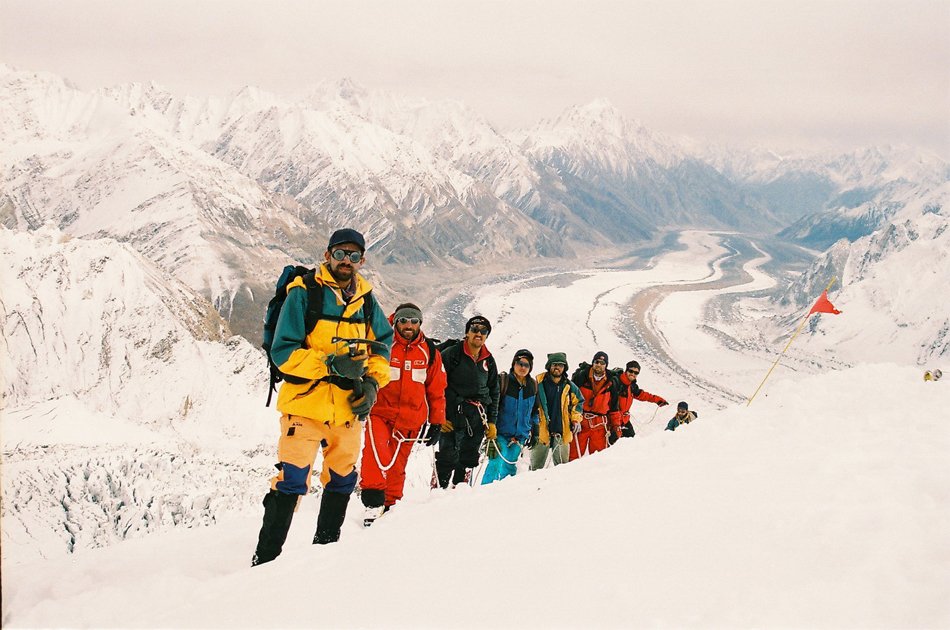
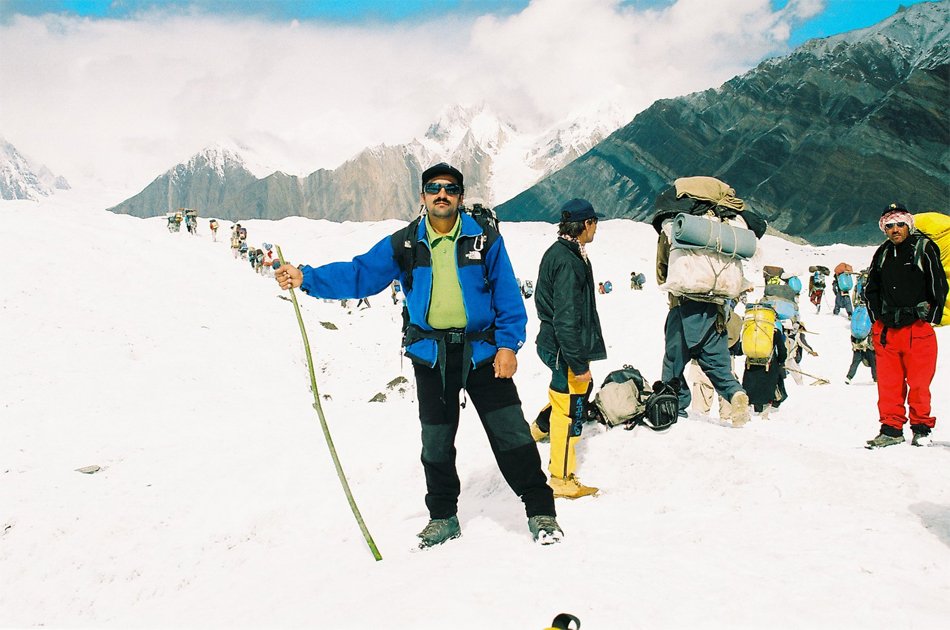

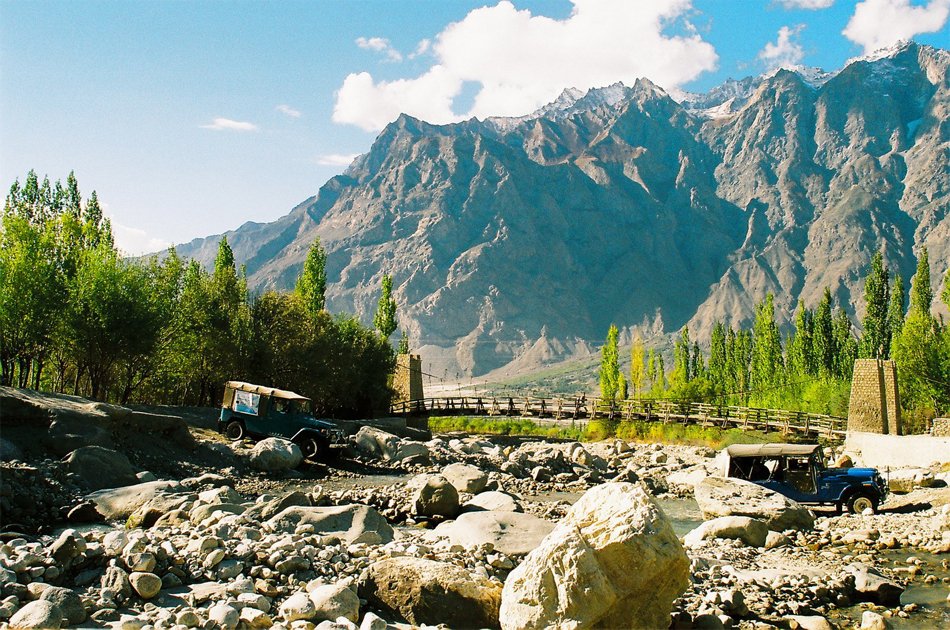
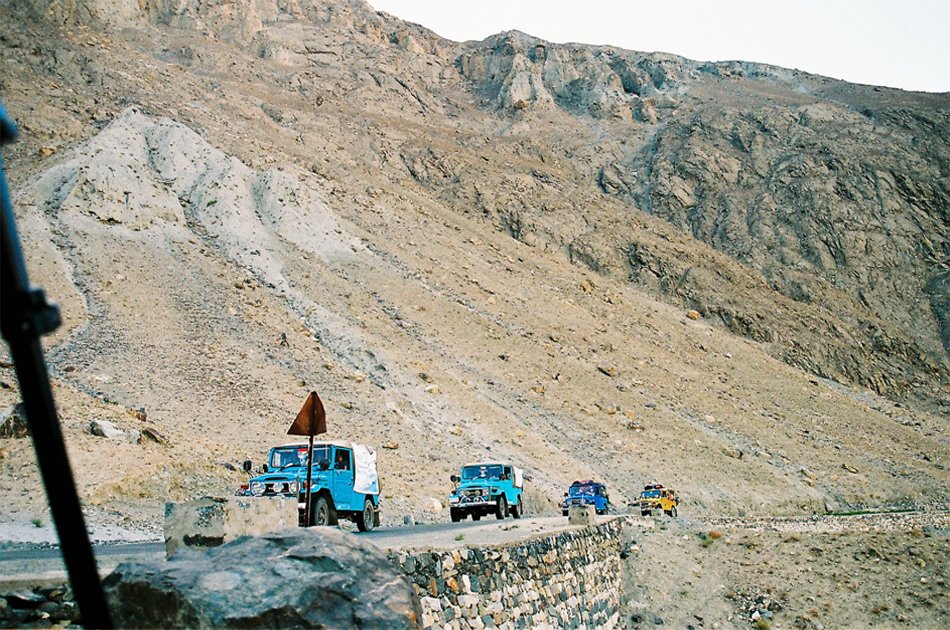

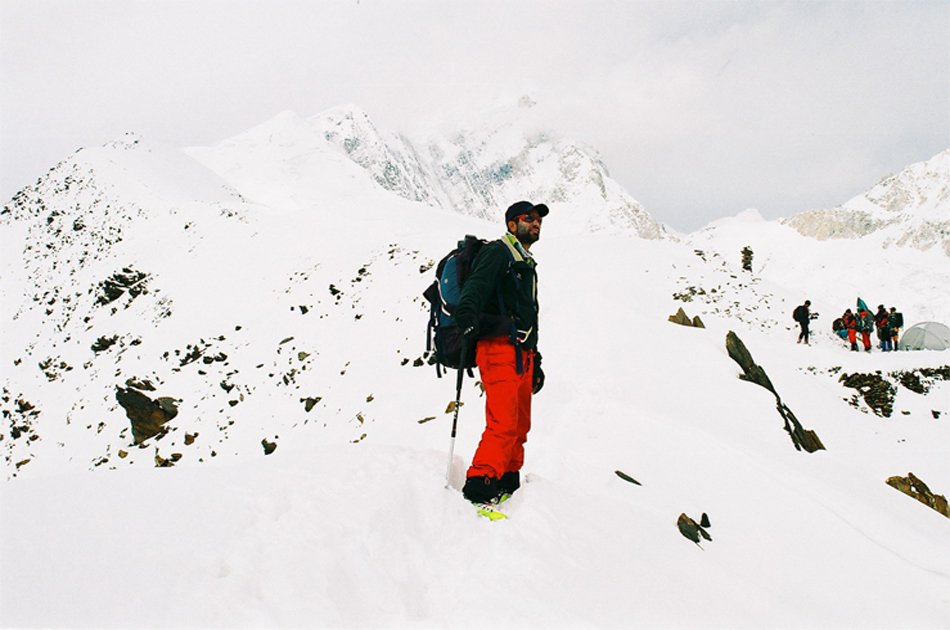

 Product code: 4465
Product code: 4465  © Copyright 2024 Private Tour Inc. All Rights Reserved.
© Copyright 2024 Private Tour Inc. All Rights Reserved.